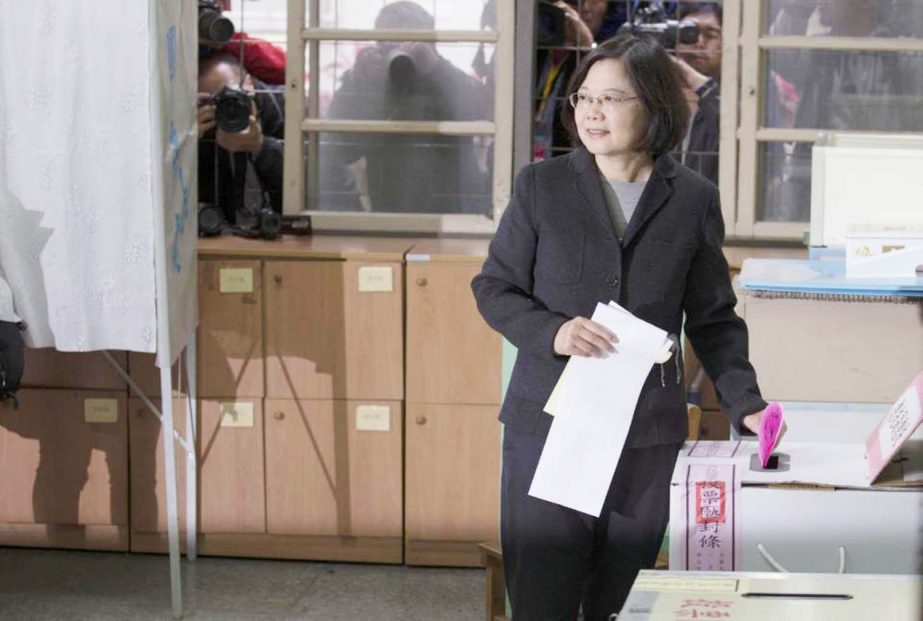
Reuters, Taipei :
Taiwan looks set on Saturday to elect an independence-leaning opposition leader as its first woman president who could usher in a new round of uncertainty with China, the massive neighbor that claims the self-ruled island as its sacred territory.
Tsai Ing-wen, leader of the Democratic Progressive Party (DPP), is expected to be thrust into one of Asia’s toughest and most dangerous jobs, with China pointing hundreds of missiles at the island, decades after losing Nationalists (KMT) fled from Mao Zedong’s Communists to Taiwan in the Chinese civil war.
She will have to balance the superpower interests of China, which is also Taiwan’s largest trading partner, and the United States with those of her freewheeling, democratic home.
Tsai risks antagonizing China if she attempts to forcefully assert Taiwan’s sovereignty and reverses eight years of warming China ties under incumbent President Ma Ying-jeou of the Nationalists, whose forces retreated to Taiwan in 1949.
“I had a good sleep last night. We’ve done the best we could. We’re leaving today to the hands of the voters,” Tsai told reporters after she cast her vote early at a ballot station near her home on the outskirts of the capital Taipei.
In a statement carried by state media, China’s Taiwan Affairs Office repeated it would not get involved in the election, saying only that it was “paying attention to across the Taiwan Strait”.
A 16-year-old Taiwan singer with a South Korean girl band inadvertently shot to the top of the election agenda on polling day after she publicly apologized for holding a Taiwan flag, prompting China and Taiwan to trade accusations.
The election comes at a tricky time for Taiwan’s export-dependent economy, which slipped into recession in the third quarter last year. China is also Taiwan’s top trading partner and Taiwan’s favorite investment destination.
“During the past years under the Ma Ying-jeou administration, Taiwan’s economy didn’t get better but deteriorated instead. People think he has been getting too close to China,” said Deng Chia-ling, 40, a housewife.
Support for the DPP has swelled since 2014, when hundreds of students occupied Taiwan’s parliament for weeks in the largest display of anti-China sentiment the island had seen in years.
“I’m not afraid of China. We are a democratic country, and it’s China who should learn from us,” said a 70-year-old farmer who only gave his surname Chen, queuing at a voting station in rural Yilan, a county east of the capital.
Taiwan looks set on Saturday to elect an independence-leaning opposition leader as its first woman president who could usher in a new round of uncertainty with China, the massive neighbor that claims the self-ruled island as its sacred territory.
Tsai Ing-wen, leader of the Democratic Progressive Party (DPP), is expected to be thrust into one of Asia’s toughest and most dangerous jobs, with China pointing hundreds of missiles at the island, decades after losing Nationalists (KMT) fled from Mao Zedong’s Communists to Taiwan in the Chinese civil war.
She will have to balance the superpower interests of China, which is also Taiwan’s largest trading partner, and the United States with those of her freewheeling, democratic home.
Tsai risks antagonizing China if she attempts to forcefully assert Taiwan’s sovereignty and reverses eight years of warming China ties under incumbent President Ma Ying-jeou of the Nationalists, whose forces retreated to Taiwan in 1949.
“I had a good sleep last night. We’ve done the best we could. We’re leaving today to the hands of the voters,” Tsai told reporters after she cast her vote early at a ballot station near her home on the outskirts of the capital Taipei.
In a statement carried by state media, China’s Taiwan Affairs Office repeated it would not get involved in the election, saying only that it was “paying attention to across the Taiwan Strait”.
A 16-year-old Taiwan singer with a South Korean girl band inadvertently shot to the top of the election agenda on polling day after she publicly apologized for holding a Taiwan flag, prompting China and Taiwan to trade accusations.
The election comes at a tricky time for Taiwan’s export-dependent economy, which slipped into recession in the third quarter last year. China is also Taiwan’s top trading partner and Taiwan’s favorite investment destination.
“During the past years under the Ma Ying-jeou administration, Taiwan’s economy didn’t get better but deteriorated instead. People think he has been getting too close to China,” said Deng Chia-ling, 40, a housewife.
Support for the DPP has swelled since 2014, when hundreds of students occupied Taiwan’s parliament for weeks in the largest display of anti-China sentiment the island had seen in years.
“I’m not afraid of China. We are a democratic country, and it’s China who should learn from us,” said a 70-year-old farmer who only gave his surname Chen, queuing at a voting station in rural Yilan, a county east of the capital.

